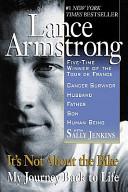Quotes from book
It's Not About the Bike: My Journey Back to Life

It's Not About the Bike: My Journey Back to Life is a 2000 autobiographical book by American cyclist Lance Armstrong with Sally Jenkins.
Source: It's Not About the Bike: My Journey Back to Life (2000), p. 1
Context: I want to die at a hundred years old with an American flag on my back and the star of Texas on my helmet, after screaming down an Alpine descent on a bicycle at 75 miles per hour. I want to cross one last finish line as my wife and my ten children applaud, and then I want to lie down in a field of those famous French sunflowers and gracefully expire, the perfect contradiction to my once anticipated poignant early demise.
Source: It's Not About the Bike: My Journey Back to Life (2000), p. 113
Context: I wished hard, but I didn't pray. I had developed a certain distrust of organized religion growing up, but I felt I had the capacity to be a spiritual person, and to hold some fervent beliefs. Quite simply, I believed I had a responsiblity to be a good person, and that meant fair, honest, hardworking, and honorable. If I did that, if I was good to my family, true to my friends, if I gave back to my community or to some cause, if I wasn't a liar, a cheat, or a thief, then I believed that should be enough. At the end of the day, if there was indeed some Body or presence standing there to judge me, I hoped I would be judged on whether I had lived a true life, not on whether I believed in a certain book, or whether I'd been baptized. If there was indeed a God at the end of my days, I hoped he didn't say, "But you were never a Christian, so you're going the other way from heaven." If so, I was going to reply, "You know what? You're right. Fine."
Source: It's Not About the Bike: My Journey Back to Life (2000), p. 113
Context: I wished hard, but I didn't pray. I had developed a certain distrust of organized religion growing up, but I felt I had the capacity to be a spiritual person, and to hold some fervent beliefs. Quite simply, I believed I had a responsiblity to be a good person, and that meant fair, honest, hardworking, and honorable. If I did that, if I was good to my family, true to my friends, if I gave back to my community or to some cause, if I wasn't a liar, a cheat, or a thief, then I believed that should be enough. At the end of the day, if there was indeed some Body or presence standing there to judge me, I hoped I would be judged on whether I had lived a true life, not on whether I believed in a certain book, or whether I'd been baptized. If there was indeed a God at the end of my days, I hoped he didn't say, "But you were never a Christian, so you're going the other way from heaven." If so, I was going to reply, "You know what? You're right. Fine."
Source: It's Not About the Bike: My Journey Back to Life (2000), p. 267
Context: Anything is possible. You can be told you have a 90-percent chance or a 50-percent chance or a 1-percent chance, but you have to believe, and you have to fight. By fight I mean arm yourself with all the available information, get second opinions, third opinions, and fourth opinions. Understand what has invaded your body, and what the possible cures are. It's another fact of cancer that the more informed and empowered patient has a better chance of long-term survival. What if I had lost? What if I relapsed and the cancer came back? I still believe I would have gained something in the struggle, because in what time I had left I would have been a more complete, compassionate, and intelligent man, and therefore more alive.
Source: It's Not About the Bike: My Journey Back to Life (2000), p. 267
Context: Anything is possible. You can be told you have a 90-percent chance or a 50-percent chance or a 1-percent chance, but you have to believe, and you have to fight. By fight I mean arm yourself with all the available information, get second opinions, third opinions, and fourth opinions. Understand what has invaded your body, and what the possible cures are. It's another fact of cancer that the more informed and empowered patient has a better chance of long-term survival. What if I had lost? What if I relapsed and the cancer came back? I still believe I would have gained something in the struggle, because in what time I had left I would have been a more complete, compassionate, and intelligent man, and therefore more alive.